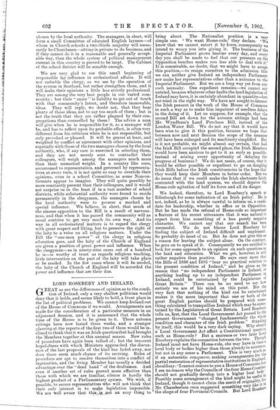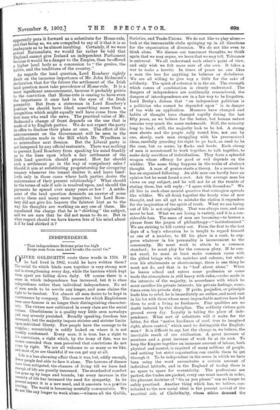LORD ROSEBERY AND IRELAND.
el_REAT as are the differences of opinion as to the condi- tion of Ireland, only a very shallow politician would deny that it holds, and seems likely to hold, a front place in the list of political problems. We cannot keep Ireland out of the House of Commons if we would. Arrangements are made for the consideration of a particular measure in an adjourned Session, and it is announced that the whole time of the House is to be given to it. These autumn sittings have now lasted three weeks, and a stranger glancing at the reports of the first two of them would be in- clined to think that it was an Irish question that had brought the Members together at this unusual season. New rules of procedure have again been talked of ; but the innocent hopefulness with which Ministers approached the discus- sion of the last proposals of the kind has faded away, nor does there seem much chance of its reviving. Rules of procedure are apt to resolve themselves into a conflict of ingenuities, and the living Member has usually a decided advantage over the "dead hand" of the draftsman. And even if another set of rules proved more effective than those with which we are familiar, silence is hardly the highest product of a Parliamentary system. We wish, if possible, to secure representatives who will not think that their only interest is to uislie legislation impossible. We are well aware that thisiii,e,,tiot an easy thing to bring about. The Nationalist position is a very simple one. We want Home-rule,' they declare. know that we cannot extort it by force, consequently we intend to weary you into giving it. The business of the Imperial Parliament grows heavier every day, and every day you shall be made to feel that our presence on the Opposition benches makes you less able to deal with it.' It is conceivable, no doubt, that we might have to accept this position,—to resign ourselves to the admission that we can neither give Ireland an independent Parliament nor make her representatives other than a nuisance to the Imperial Parliament. But we are a long way yet from any such necessity. One expedient remains—we cannot say untried, because whatever other faults the land legislation Of Ireland may have, it is certainly abundant in quantity—but not tried in the right way. We have not sought to interest the Irish peasant in the work of the House of Commons in such a way as to make him impatient of needless delays in the doing of it. Let us suppose, for example, that the second Bill set down for the autumn sittings had ben Mr. Wyndham's Land Purchase Bill, instead of the London Water Bill. We do not say that it would have been wise to give it this position, because we hope that between now and next Session the scope of the measure will have been enlarged and its machinery simplified. But is it not probable, we might almost say certain, that had the Irish Bill occupied the second place, the Irish Members would have been anxious to get to it as early as possible, instead of seizing every opportunity of delaying the progress of business ? We do not mean, of course, that it would be either possible or expedient to go on dangling Irish Bills before the Irish constituencies in the hope that they would keep their Members in better order. But we do mean that if we could make the Irish electorate fairly contented with the land system, we should deprive the Home-rule agitation of half its force and all its danger.
We looked, therefore, to Lord Rosebery's speech at Edinburgh for some indication of an Irish policy. He is not, indeed, as he is always careful to inform us, a candi- date for leadership, whether in office or in Opposition. But he has made the refusal of Home-rule so important a feature of his recent utterances that it was natural to expect from him something of a less purely negative character. We cannot say that our search has been successful. We do not blame Lord Rosebery for finding the subject of Ireland difficult and unpleasant. So probably do most of us. But he does not give this as a reason for leaving the subject alone. On the contrary, he goes on to speak of it. • Consequently we are entitled to look for some approach to an opinion on such questions as the land and education. What we get, however, is still rather negative than positive. He says once more that the Bills of 1886 and 1893 "bear no practical relation to the present condition of Ireland," and he gives as the reason that "no independent Parliament in Ireland, or anything leading up to an independent Parliament in Ireland, could be entertained by the Legislature Of Great Britain." There can be no need to say how entirely we are of his mind on this point. But the very fact that nothing of the kind can be entertained makes it the more important that one or both of the 'great English parties should be prepared with some thing calculated to tranquillise Ireland which may be enter- tained by the Legislature of Great Britain. Lord Rosebery tells us, first, that the Local Government Act passed by the present Government "changed fundamentally the whole condition and character of the Irish problem." standing by itself, this would be a very dark saying. a Local Government Act affect a Constitutional? such as Home-rule ? But a sentence or two later Lord Rosebery explains the connection between the two. . _ Ireland must not have Home-rule, she may have in tune a yqusashotuietna h local body or bodies higher than those already in e:istihtcenug:;51: but not in any sense a Parliament. This is very mats for h. if an autocratic conqueror, making arrangemell partial restoration of representative institutions in Eng (I! should say: sIcannot restore to you a House of Commons,1?nts• I see no reason why the Councils of the four Home Coufl should not gradually develop useful in Possibly some arrangement of the kind.might.be. ahty, for into a higher local boa.
Ireland, though it cannot claim the merit of ongui very like _ Mr. Chamberlain once suggested. somethingit Ifl the shape of four Provincial Councils, But Lord &sem' apparenfly puts it forward as a substitute for Home-rule, and that being so, we are compelled to say of it that it is so inadequate as to be almost insulting. Certainly, if we were ardent Nationalists, we would far rather be told that England cannot give Ireland an independent Parliament because it would be a danger to the Empire, than be offered a higher local body as a concession to "the genius, the habits, and the traditions of the country."
As regards the land question, Lord Rosebery rightly dwelt on the immense importance of Mr. John Redmond's declaration that for the future the settlement of the Irish land question must take precedence of Home-rule. It is a most significant announcement, because it probably points to the conviction that Home-rule is ceasing to have even the importance it once had in the eyes of the Irish peasantry. But from a statesman in Lord Rosebery's position we should have liked something more than a recognition which might equally well have come from the first man who read the news. The practical value of Mr. Redmond's change of front depends on the use that is made of it by English parties. We do not expect the party in office to disclose their plans at once. The effect of the announcement on the Government will be seen in the modifications made in the Bill which Mr. Wyndham is to reintroduce next Session. But the Liberal party is not hampered by any official restraints. There was nothing to prevent Lord Rosebery from speaking his mind frankly as to the lines upon which a fair settlement of the Irish land question should proceed. How far should such a settlement go in the way of compulsory sales ? Should it aim at substituting proprietorship for occupying tenancy whenever the tenant desires it, and leave land- lords only in those cases where both parties desire the maintenance of their present relationship ? What should be the terms of sale if sale is resolved upon, and should the payments be spread over many years or few ? A settle- ment of the land question demands an answer of some sort to these and many more inquiries ; but Lord Rose- bery did not give his hearers the faintest hint as to the way his thoughts are working on any one of them. He repudiated the charge that he is " shirking " the subject, and we are sure that he did not mean to do so. But in what respect should we have known less of his mind about it if be had shirked it ?











































 Previous page
Previous page